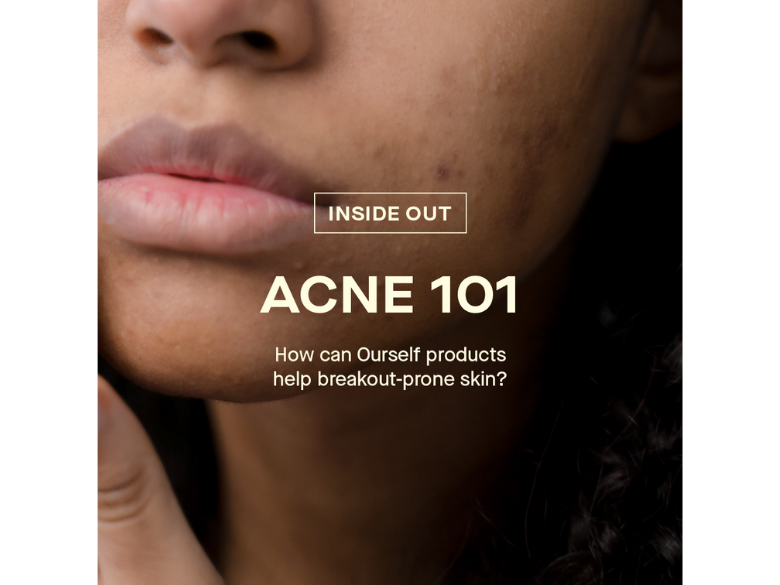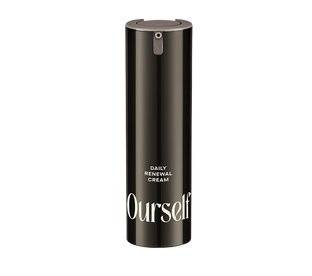
What’s the best way to treat and prevent breakouts?
Acne, as you might know, is a fickle issue. It’s the most common skin condition in the world, but there’s no singular, guaranteed path to getting past it. We can do all the “right things”: switching up skincare products, altering our diets, drinking more water, thinking positive thoughts, but acne seems to come and go as it pleases, mostly immune to our crusades against it. It’s frustrating, but there is a lesson to be learned. Instead of fighting against the tide, the best thing we can do for the zits and spots that call our face home is to treat them with care instead of trying to rush them out the door. Skeptical? Hear us out.
There are many root causes of acne, including hormonal changes, genetics, and environmental factors.Yet, when breakouts occur, we tend to take the same “slash-and-burn” approach:. We reach for the most potent, drying products we can find to get things under control, which is quite literally the opposite of what acne-prone skin needs. It might sound a little out there, but working with your acne instead of fighting against it may very well be the key to getting your skin to a happier place. Here, three cardinal rules to keep in mind as you embark on this journey.
Protect Your Skin Barrier Against Acne
As we just mentioned, there is a tendency when treating acne to try and dry the life out of your skin. It’s a common misconception that all oil is bad oil, but the science says otherwise. Why does your skin barrier matter? Because it’s your skin’s built-in peacekeeper, regulating your skin’s moisture level while keeping the good stuff in and the unwanted stuff out. When you’re breaking out and aim for the harshest products you can find, you might be temporarily drying your zits out, but you may also be doing significant damage to your skin barrier, leading to even more irritation and worse breakouts.
So, keeping your skin barrier properly hydrated and protected is absolutely essential to treating your acne. What’s the best way to do this? First, avoid ingredients that are known to irritate, such as alcohol, essential oils, and synthetic fragrances, and aim for a gentle cleanser that won’t strip skin. Second, moisturize, moisturize, moisturize. What type is best? Look for one that’s simple but effective. We createdDaily Renewal Cream to fulfill our ideal of what a moisturizer should be, meaning that it’s incredible at keeping your skin in balance. It’s deeply nourishing and hydrating thanks to hyaluronic acid, but it’s also got some majorly inflammation-soothing ingredients like ginger root and rice extract. And if you’re in need of something a bit more substantial, it’s got an even richer counterpart.
How SPF Can Help With Acne
You’ve heard it a million times, but we’re here to say it again: wear SPF every single day. When it comes to acne, a big part of the struggle is dealing with the scars that are left behind once a zit finally makes its exit. SPF is a must for everyone, but it’s especially important if you’re prone to acne scars, AKA post-inflammatory hyperpigmentation. UV exposure is bad news for acne because it interferes with the healing process and can trigger the production of excess melanin, leaving visible scarring that can be very difficult to fade. By wearing SPF daily, you’re doing your future self a favor by stopping scarring before it even starts. What kind of SPF is best? Look for one that’s broad-spectrum and at least SPF 30. And better yet, opt for one that has additional benefits, like Mineral Sunscreen Broad Spectrum SPF 50, which smooths and calms with niacinamide and vitamin E, allowing you to tick a few skincare boxes off at once. Incorporate Daily Dark Spot Intercept into your routine as well: it halts spots at the source and helps you maintain a clearer, more even-toned complexion all around.
Additional Defense Against Acne
We’re big advocates of the theory that prevention is the way to go when taking care of your skin, but there are no doubt times when you want to swing for the fences and take care of a frustrating skin situation once and for all. If you’ve reached this point with your acne, a chemical peel might be right for you. Peels work by removing the acne-affected outer layers of your skin, thereby allowing new, healthy skin to come to the surface. They’re far more potent than most daily, topical acne-fighting products, which can be intimidating if you’re new to them, but they’re unmatched in their ability to help clear existing breakouts and fade scarring.
There are many kinds of chemical peels on the market, but there’s one that’s a match made in heaven for light-to-moderate acne-prone skin—the glycolic acid peel. (If you’re experiencing severe and/or cystic acne, it’s best to check with a dermatologist before peeling.) Glycolic acid is an alpha hydroxy acid (AHA) with a low molecular weight, meaning that it’s small enough to penetrate deep into your pores, loosening acne-causing oil and debris and turning over old skin cells. The result? Glowing, clearer, and more even skin tone and texture.
We developed the Ourself Brightening Peel specifically to treat hyperpigmentation: It’s formulated to brighten and even skin tone, and thanks to an impressive 34% glycolic acid infusion, it’s also an amazing exfoliator that clarifies, reduces the look of pores, and again, sloughs dead skin cells off, (which can help prevent the clogged pores that cause breakouts). It also helps to fade the look of post-inflammatory hyperpigmentation such as acne marks. The key to its efficacy is the high concentration of glycolic acid; (the 34 percentage is typically unavailable for in-home use.) Why 34%? It’s the percentage that our expert scientists determined is strong enough to deliver clinical-level results without compromising your skin barrier. That means you can arm yourself with a serious defense against acne without compromising the fundamental health of your skin, and that’s a win we’ll take.

